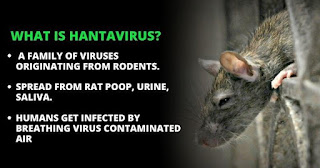What is Hanta Virus?
What is Hanta virus?
Family: Hantaviridae
Scientific Name: Hantavirus
Class: Ellioviricetes
Order: Bunyavirales
Rank: Genus
Hanta viruses are a family of
viruses spread mainly by rodents and can cause varied disease syndromes
in people worldwide. Infection with any hanta virus can produce
hanta virus disease in people. Hanta viruses in the America are known as
“New World” hanta viruses and may cause Hanta Virus Pulmonary Syndrome (HPS). Other hanta viruses, known as “Old World” hanta viruses, are found mostly in Europe and Asia and may cause Hemorrhagic Fever with Renal Syndrome (HFRS).
Each hanta virus serotype has a specific rodent host species and is
spread to people via aerosolized virus that is shed in urine, feces, and
saliva, and less frequently by a bite from an infected host. The most
important hantavirus in the United States that can cause HPS is the Sin Nombre virus, spread by the deer mouse.
Signs & Symptoms
Due to the small number
of HPS cases, the “incubation time” is not positively known. However,
on the basis of limited information, it appears that symptoms may
develop between 1 and 8 weeks after exposure to fresh urine, droppings,
or saliva of infected rodents.
Early Symptoms
Early symptoms include fatigue, fever and muscle aches, especially in the large muscle groups—thighs, hips, back, and sometimes shoulders. These symptoms are universal.There may also be headaches, dizziness, chills, and abdominal problems, such as nausea, vomiting, diarrhea, and abdominal pain. About half of all HPS patients experience these symptoms.
Late Symptoms
Four to 10 days after the initial phase of illness, the late symptoms of HPS appear. These include coughing and shortness of breath, with the sensation of, as one survivor put it, a “…tight band around my chest and a pillow over my face” as the lungs fill with fluid.Is the Disease Fatal?
Yes. HPS can be fatal. It has a mortality rate of 38%.Diagnosis of Hanta Virus
Diagnosing HPS in an individual who has only been infected a few days is difficult, because early symptoms such as fever, muscle aches, and fatigue are easily confused with influenza. However, if the individual is experiencing fever and fatigue and has a history of potential rural rodent exposure, together with shortness of breath, would be strongly suggestive of HPS. If the individual is experiencing these symptoms they should see their physician immediately and mention their potential rodent exposure.Transmission
How People Get Hantavirus Infection
In the United States, deer mice (along with cotton rats and rice rats in the southeastern states and the white-footed mouse in the Northeast) are reservoirs of the hantaviruses. The rodents shed the virus in their urine, droppings, and saliva. The virus is mainly transmitted to people when they breathe in air contaminated with the virus.When fresh rodent urine, droppings, or nesting materials are stirred up, tiny droplets containing the virus get into the air. This process is known as “airborne transmission“.
There are several other ways rodents may spread hantavirus to people:
- If a rodent with the virus bites someone, the virus may be spread to that person, but this type of transmission is rare.
- Scientists believe that people may be able to get the virus if they touch something that has been contaminated with rodent urine, droppings, or saliva, and then touch their nose or mouth.
- Scientists also suspect people can become sick if they eat food contaminated by urine, droppings, or saliva from an infected rodent.
In Chile and Argentina, rare cases of person-to-person transmission have occurred among close contacts of a person who was ill with a type of hantavirus called Andes virus.
Prevention
Eliminate or minimize contact with rodents in your home, workplace, or campsite. If rodents don’t find that where you are is a good place for them to be, then you’re less likely to come into contact with them. Seal up holes and gaps in your home or garage. Place traps in and around your home to decrease rodent infestation. Clean up any easy-to-get food.Recent research results show that many people who became ill with HPS developed the disease after having been in frequent contact with rodents and/or their droppings around a home or a workplace. On the other hand, many people who became ill reported that they had not seen rodents or rodent droppings at all. Therefore, if you live in an area where the carrier rodents are known to live, try to keep your home, vacation place, workplace, or campsite clean.




